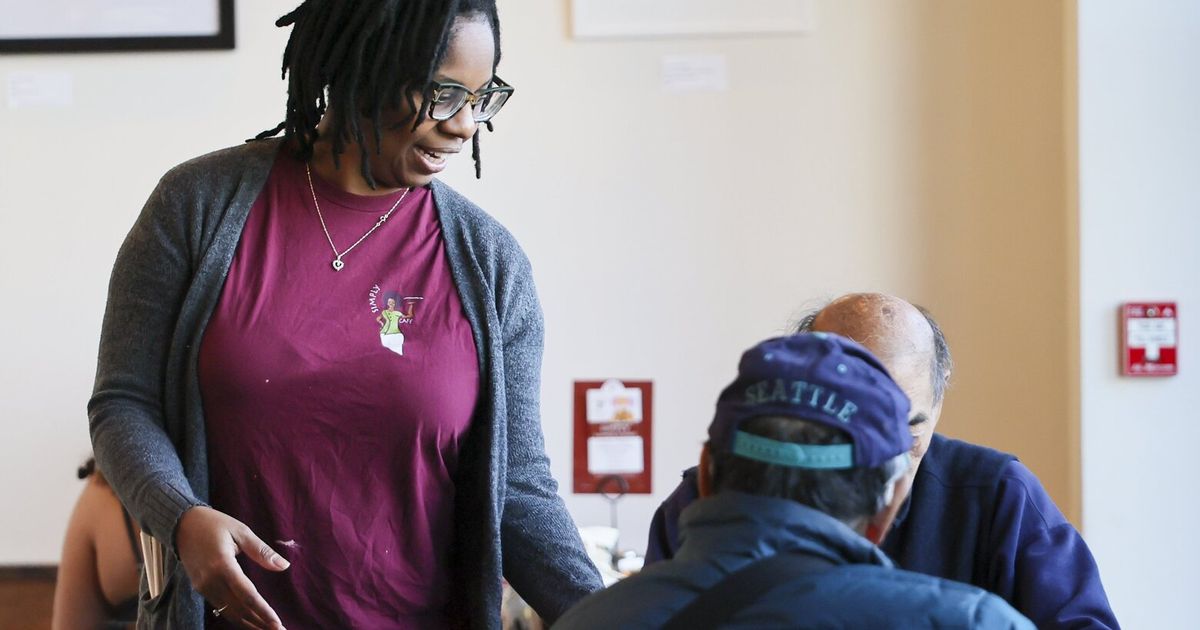Feeding the community was always in her family’s blood.
From church gatherings to potlucks, Lillian Rambus’ grandmother’s sweet potato pies and other dishes would delight those who were lucky enough to partake.
So when Rambus and her mom, Barbara Collins, teamed up to fulfill their dream of opening a soul food restaurant, Simply Soulful, in Seattle’s Madison Valley in 2014, it seemed a natural fit.
But the dream has proved less than idyllic.
We rightly talk all the time in Seattle about the affordability crisis. The cost of rent, groceries, dining out, ride share for Seattle residents are all some of the highest in the country.
But also caught in the affordability trap are small businesses, particularly ones owned by Black, Indigenous and other people of color.
By every measure, running a business is often tougher for people of color. For example, a University of Washington report earlier this year found that BIPOC-owned small businesses paid higher interest rates on loans than their white counterparts.
Over the past few years, small, family-owned restaurants, for example, have had to weather the impacts of the COVID pandemic only to see higher labor costs and now increases in food prices and other expenses due to tariffs. Many businesses are dealing with rent increases as well as higher prices for insurance and impacts from vandalism and other public safety issues. On top of all that, the affordability crisis has caused customers to dine out less, further adding pressure to small-business bottom lines.
Legacy of racial wealth gap
Rambus believes part of what is exacerbating the hardship for small businesses like hers is that the city has lumped all businesses together into a “business community,” despite the reality that a small business like hers has almost nothing in common with a big corporation like Amazon.
“Seattle, they didn’t listen to us when we were screaming at the top of our lungs trying to tell them that, ‘hey, you know you’re gonna put us out of business. Hey, hey, you’re killing us, you’re killing us,’ ” Rambus said. “You know, they just haven’t listened and you’ve seen Seattle bleeding small businesses.”
A Puget Sound Business Journal story in October reported 2,000 restaurants, for example, closed statewide in just the first half of the year.
Rambus said she had to lay off five employees earlier this year and worries about the future if conditions don’t improve for the business.
These hardships are heightened when you overlay the reality of the racial wealth gap. As I have written about before, Seattle’s history of restrictive deeds, redlining and employment discrimination that limited Black workers to less lucrative jobs were just some of the factors that contributed to the persistent wealth gap we see today.
A 2021 report, for example, found that the value of white-owned businesses in Seattle was 12 times the value of Black-owned businesses.
As Rambus said, what affects the white population is going to hurt the Black population even more. “Our businesses are hit even harder, right? Because a lot of times we don’t have the capital,” she said.
Like many other street-level small businesses in Seattle, Simply Soulful has also had to weather crime and vandalism. Now located on Jackson street in the Central District, last week someone smashed their glass door early morning and stole their cash box. While the cash box only had change in it, the box itself cost hundreds to replace, boarding up the door several hundreds more and the quote to replace the glass, $1,900.
While the city’s Storefront Repair Fund is available through December (or until funds run out) to help in these situations, as a reimbursement program, business owners have to front the cash first — not to mention the time and stress of dealing with the damage.
Rambus and Simply Soulful run a community feeding program from the restaurant to help those struggling with food insecurity. She has empathy for whoever broke into their business, knowing that “there’s a lot of need all around, and people do what they need to do out of necessity to survive.”
Costs up, revenues down
Uttam Mukherjee and his wife, Aakanksha Sinha, started their business Spice Waala because they wanted to marry their love of business and social justice and food just came naturally to them.
Their goal was to represent Indian street food in Seattle while doing good for the community. After opening their first brick and mortar location on Capitol Hill in 2019, they now have several locations serving kathi rolls and a number of other street foods.
Mukherjee said that while things were tough during the pandemic, the overwhelming support from the community for small businesses helped provide the revenue to offset the rise in costs.
But now, he said, there’s a hit to both the top and the bottom lines. Even at their affordable prices (a kathi roll is $8.50) he said customers are more reluctant to eat out, given all their other expenses going up. He said revenue has dropped drastically for them, with the Columbia City location seeing a 50% decline.
On top of that, expenses are up, with higher wages, rents and food costs taking a larger bite of their revenue. Tariffs have led to lamb being 50% more expensive, he said. Mukherjee said the changes to food delivery charges have also been a huge hit for their business. He said delivery companies added so many fees the costs became so high for customers that he has seen a 50% drop in revenue from Uber Eats, as one example.
As a social enterprise, paying a living wage is very important to Mukherjee, but he said something has to give.
Living wage woes
Often the city’s higher minimum wage is seen as an easy scapegoat for the struggles of small businesses, but the truth is, January’s new $21.31 Seattle minimum wage is still far short of a living wage in the city.
According to MIT’s living wage calculator, an adult with no children would need to make $30.82 an hour or just over $64,000 a year to earn a living wage in King County. A Seattle Times story in August reported a King County renter would need to make $92,000 a year to afford a modest one-bedroom apartment plus utilities.
Capitol Hill bartender Charlie Smith knows this reality all too well.
Even with the higher minimum wage, Smith, 31, who uses they/them pronouns, said their income has gone down due to lower tips. Smith projects they will earn about $28,000 this year working about 30 hours a week. Smith is not looking for a lavish lifestyle, opting to not have a car to keep his expenses down.
Smith can clearly see how small businesses are struggling, but said, “It is disheartening to see the blame for these high costs be also put on the workers who are still not doing well with a $20 minimum wage.”
Solutions
So what can be done to take some of the pressure off small businesses? A lot of things.
Danielle Alvarado, the executive director at Working Washington and the Fair Work Center, said it’s important to remember that small businesses and workers have a lot more overlapping interests than a lot of the major corporations.
She said we all have a vested interest in small businesses staying open as well as living wages for workers, because that money is then invested back into the local community.
Alvarado said the same creativity used to come up with higher minimum wages — leveraging a coalition of labor and business — could be applied to tackle affordability challenges as well. Taking a look at ways to lower commercial rent, for example, could be one place to start.
Michael Verchot, the founding director of the Consulting and Business Development Center at the University of Washington, has worked to support underserved small businesses for decades.
He said part of what needs to happen is for some corporate leaders to take more responsibility for tackling affordability in the region.
“We’re going to need some of our corporate leaders, if they’re serious about making Washington a good place for everybody, to step up and say, ‘yes, this might cost me a little bit more, but that’s going to mean that I’m going to have the diversity of workers here’ ” that will allow workers to stay and raise kids here, he said.
One example of that kind of rebalancing could be the recent B&O tax change, which Seattle voters overwhelmingly approved in November to lower taxes on small businesses and raise them for the top 10% highest-grossing businesses. Even so, for a business earning $500,000 in revenue, the financial relief would be just $1,110 a year.
Verchot also said consumers can make choices in their daily lives to support the businesses in their communities that share their values to ensure those businesses survive.
Mukherjee said looking at help with delivery fees, tax and license fees as well as support on the revenue side with marketing assistance could all create the building blocks needed to make small business more sustainable here.
While he said he has been part of restaurant groups advocating for small business, none of it really matters if no one is listening. “We’ve been at the table. It’s just that we haven’t been heard, right? And so that needs to change dramatically for any kind of impact to actually be had.”
Rambus said getting small-business owners in a conversation with the city could help them better understand the actual conditions on the ground so that they could come up with effective solutions. “It’s like they want to balance the affordability on the backs of some of us business owners and shoot, we’re trying to survive the same thing that they claim that they want our employees to survive.”







